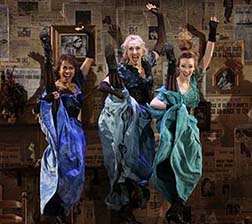
TWO VIEWS OF
"THE UNSINKABLE MOLLY BROWN"
Philip Dorian
Lucy Komisar
|
Buoyant Performance Re-floats Through April 5 at Abrons Art Center, 466 Grand Street, NYC.
Composer-lyricist Meredith Willson’s 1960 musical “The Unsinkable Molly Brown” was inspired by an exaggerated tale about the exploits of real-life Titanic survivor Margaret Tobin Brown. While not as successful as Willson’s “The Music Man,” which it followed by three years to Broadway (and which was still running), “Molly Brown” ran for fifteen months on the strength of Willson’s score (Richard Morris wrote the book) and Tammy Grimes’ Tony-winning performance. Debbie Reynolds was nominated for an Oscar in the 1964 movie, and while Kathy Bates was not nominated for playing Molly in the movie “Titanic,” she was named Blockbuster Entertainment’s Favorite Supporting Actress for the role. (Remember Blockbuster?) Beth Malone will not be Tony-nominated for the Transport Group’s revival of “Molly Brown,” running through April 5 at Abrons Arts Center, because Tony recognizes only Broadway, and AAC is an off-Broadway house. That noted, Ms. Malone is a sure bet for this spring’s more inclusive Drama Desk and Outer Critics Circle nominations (at least). Her Molly Brown is a ‘Can’t take your eyes off her’ performance. The original musical was a fictionalized version, with some factual references, but overall a traditional musical comedy. This revival retains seven of the original songs and adds ten others, all composed by Willson, but with mostly new lyrics by Dick Scanlon, who also substantially re-wrote Morris’s book. Scanlon, Tony-awarded in 2002 for his “Thoroughly Modern Millie” book and lyrics, did not ‘darken’ the original “Molly Brown,” as has become a prevailing technique. Rather, he humanized it. Molly and the others are three-dimensional characters in what is now a substantive Play with Music. No small accomplishment by Scanlon, and an apt framework for Kathleen Marshall’s deft direction and nimble choreography, which spans the spectrum from back-country high-stepping to high-society ballroom gliding. (A woman seated near me lamented the relatively small stage. “If they had more space they could do even more,” she said. Well, yeah…and that may well come to pass.) Identifying herself with a breezy “Call me Molly,” Margaret Tobin Brown appears in prologue testifying before a U. S. Senate Committee in May 1912 on the Titanic sinking of a month earlier. Her refusal to back down from her assessment of the “folly” that enabled the disaster establishes her bold feminist credentials from the start. It’s an effective device that hovers over the rest of the bioplay, as it unfolds in flashback. (Her takedown of the cowardly Quartermaster who commanded her lifeboat foreshadows a later simply-staged scene that makes you feel like you’re in Lifeboat No. 6 with her.) Back to 1886 and the Horace Tabor silver mine in Leadville, Colorado, where that once-precious metal’s value plummeted when the U. S. currency adopted the gold standard. Encouraged by Molly, then just nineteen, the distressed miners finally strike gold, both literally and, in Molly’s meeting and marrying soon-to-be wealthy J. J. Brown (David Aron Damane), figuratively as well. In those early scenes, Malone’s Molly is a bundle of late-teen enthusiasm and charm. She sings the original score’s “I Ain’t Down Yet” with the hearty chorus of miners, and you know she will prevail. And prevail character and performer do, through Molly’s maturing over several decades, culminating back in the post-Titanic year. The issues that evolve along the way – classism, income inequality and misogyny among them – are not hammered home gratuitously in Scanlan’s dialogue, nor do they need to be in order to resonate today. Ms. Malone is as enthralling a mature Molly as she was as the girlish, cartwheel-turning teenager.
Damane is a stalwart J. J., who shares Molly’s enthusiasm even as he harbors resentment over her dominance. “I’ll Never Say No,” they sing together (another holdover), until J. J.’s fall from grace drives them apart. With Scanlon’s lyrics set to an interpolated Willson melody, “I’d Like to Change Everything About You” is another duet highlight. And let aficionados of the original be assured (and newcomers advised), “Belly Up to the Bar, Boys” is still an ensemble barn burner. (Michael Rafter adapted Meredith Willson’s music, which, played by music director Joey Chancey’s terrific nine-piece orchestra and sung with fresh enthusiasm, is a treat.) Whitney Bashor stands out as Molly’s close friend, and Kaitlyn Davidson is a heartbreaker as the woebegone young woman sharing Molly’s lifeboat. Brett J. Banakis’s minimalist set pieces establish place, and Sky Switser’s costumes leave no doubt about time. Ms. Malone is an absolute stunner in one red gown with silvery accents, designed for her by Paul Tazewell. There may have been a reason or two to disparage Margaret Tobin Brown in real life, but you’ll not discern one in Scanlon’s script. If that’s a flaw in his dramatization, so be it. But from “Call me Molly” at the start to her closing admonition to “Be calm, never settle…we ain’t down yet,” Beth Malone is nigh flawless as the woman who rejected the notion that it was a man’s world. Her buoyancy may well float this production uptown. “The Unsinkable Molly Brown” puts
“The Unsinkable Molly Brown.” Beth Malone plays a terrific, gutsy, leftist Molly Brown who started out illiterate in a western mining town, helped her husband strike it rich in a gold mine deal, and instead of joining the nouveau riche, devoted herself to helping the poor, the union activists at her husband’s mine and the suffragists. Plus, she managed to survive the Titanic. This is Broadway quality. Malone has a strong alto voice and, with her gamine look, is a charmer. And director-choreographer Kathleen Marshall makes the production sparkle.
The production notes say, “none of the characters in the 2020 version appear in the 1960 version. Both have characters called Molly, but she says and does different things. The two versions share three lines of dialogue.” But instead of a domestic husband and wife story, this is a very political play. Molly Brown (1867-1932) was really on a lifeboat of the Titanic. When the U.S. Senate asked survivors to testify, she was one. They selected 50 men and only 2 women. Dick Scanlan’s book takes the story modern. Molly was a social progressive and a feminist. This play takes off from there.
Molly has arrived in a silver mining town and defies the miners who say women are bad luck. JJ wants to marry Molly, but she is tough, ambitious, insisting on her dreams of the future. They make a deal. The silver mine is threatened by the gold standard. The owner is supporting a pro-silver candidate for president. Molly suggests that if women voted, he’d have a better chance. Doesn’t happen. Grover Cleveland wins, silver plummets. But smart Molly helps JJ figure a way to mine gold, makes sure he gets a piece of the mine, and they become millionaires.
It’s 1895, with an excellent picture of the nouveau riche in Denver as suffocating snobs. She is at the opera with one of them, Louise Sneed-Hill (the excellent insufferable Paula Leggett Chase) and comments “Mimi dies in La Bohème.” Sneed-Hill declares, “You are not equating artists with Denver undesirables!” Molly thinks how many mouths the money spent on the opera could feed. By the way, to make a point about class, their maid, Mary (Coco Smith) eats with them at the dinner table. With profits from the richest gold mine in North America, Molly sets up a food pantry and supports suffragists. Her motto is, “Share the luck with your neighbor!”
She pays off the governor to back a separate court for juveniles. And finally, after 17 years as an activist, in 1902, she wants to run for Congress. Husband is not so happy, “I’d like to change everything about you” till you say “yes, dear.” Things will get difficult. The miners who once were JJ’s friends arrive, they want a union and JJ is against it. Sneed-Hill appears with other lady snobs in tow, and Molly and friend Julia (Whitney Bashor) spike her tea with brandy that, she acknowledges, “makes you see double and feel single!” JJ fires the workers, and she calls the “Denver Post” to announce she is with them. The first part of the book is hokey, corny, has too much of the fifties. But it gets better, and the musical values are top.
Whitney Bashor as Julia, the widow of a miner killed in a blast, has a brilliant operatic soprano. David Aron Daman, who plays JJ Brown, manager of the mine, has a fine baritone. Omar Lopez-Cepero as the miner Vincenzo has a wonderful Italian tenor. The barbershop quartet numbers are delightful. And, of course, with Marshall you get superb dancing. The dance hall girls number, “Belly up to the bar, boys” is a winner. Western square dancing is splendid. There’s more domestic drama, but I won’t spill the rest of the plot.
Except that when Molly arrives back from Europe with other saved Titanic passengers, Maureen (Kaitlyn Davidson) tells her that authorities are sending her back to Ireland, because she is now indigent and would be “a charge.” That of course is borrowed from Trump’s new immigration rules. (By the way, this was the case during the poor laws in 1600s England and the colonial U.S. People were blocked from entering towns unless they could prove they would not be a charge.) Of course, Molly, the child of Irish immigrants, solves the money problem, as friends and family on the dock sing, “Share the luck with your neighbors!” That, of course, is a Bernie line. The New York audience liked it. Don’t know yet how much other Americans agree. Visit Lucy’s website http://thekomisarscoop.com/ |
| recordings | coupons | publications | classified |








